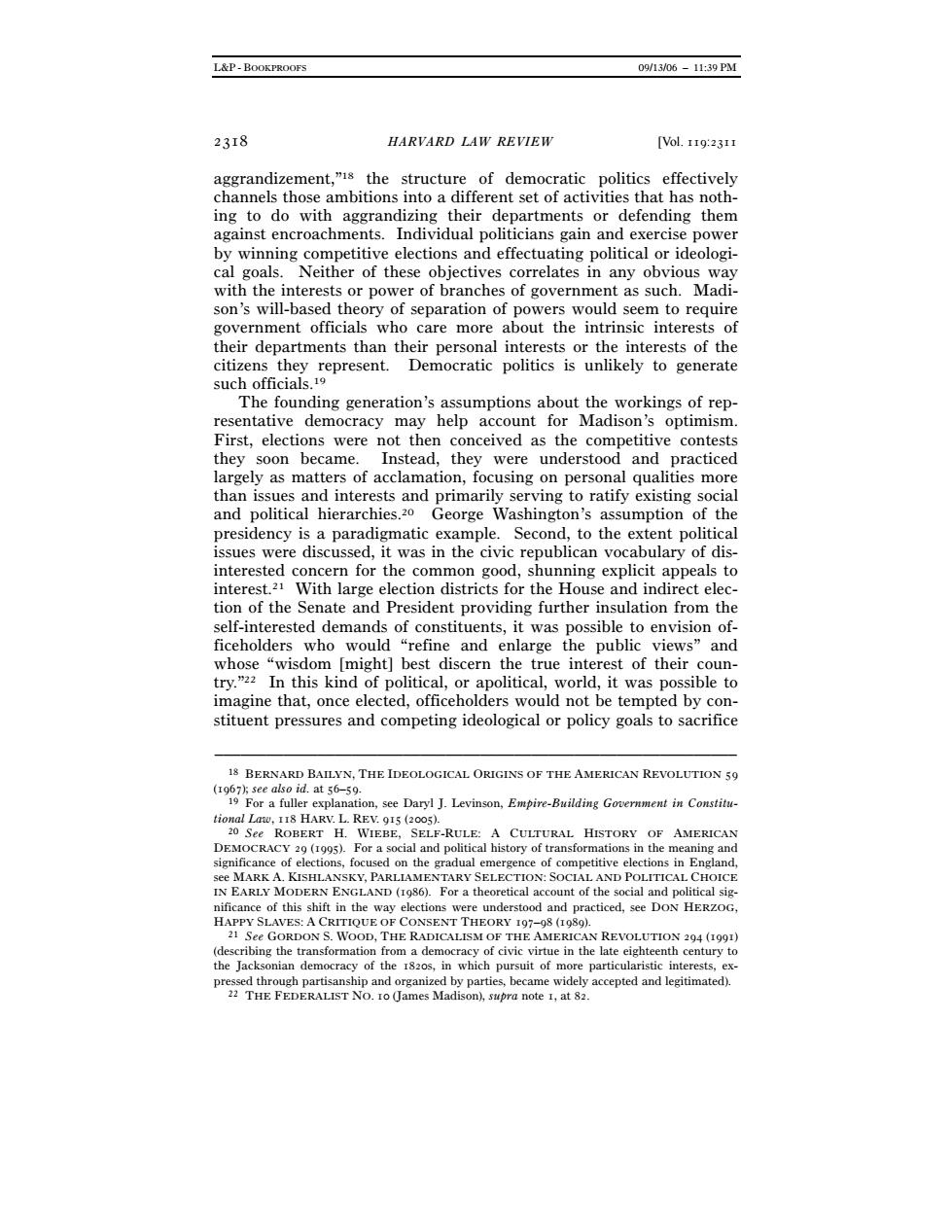正在加载图片...

L&P-BOOKPROOFS 09/13/06-11:39PM 23I8 HARVARD LAW REVIEW [Vol.I19:2311 aggrandizement,"1s the structure of democratic politics effectively channels those ambitions into a different set of activities that has noth- ing to do with aggrandizing their departments or defending them against encroachments.Individual politicians gain and exercise power by winning competitive elections and effectuating political or ideologi- cal goals.Neither of these objectives correlates in any obvious way with the interests or power of branches of government as such.Madi- son's will-based theory of separation of powers would seem to require government officials who care more about the intrinsic interests of their departments than their personal interests or the interests of the citizens they represent.Democratic politics is unlikely to generate such officials.19 The founding generation's assumptions about the workings of rep- resentative democracy may help account for Madison's optimism. First,elections were not then conceived as the competitive contests they soon became.Instead,they were understood and practiced largely as matters of acclamation,focusing on personal qualities more than issues and interests and primarily serving to ratify existing social and political hierarchies.z0 George Washington's assumption of the presidency is a paradigmatic example.Second,to the extent political issues were discussed,it was in the civic republican vocabulary of dis- interested concern for the common good,shunning explicit appeals to interest.21 With large election districts for the House and indirect elec- tion of the Senate and President providing further insulation from the self-interested demands of constituents,it was possible to envision of- ficeholders who would "refine and enlarge the public views"and whose "wisdom [might]best discern the true interest of their coun- try."22 In this kind of political,or apolitical,world,it was possible to imagine that,once elected,officeholders would not be tempted by con- stituent pressures and competing ideological or policy goals to sacrifice 18 BERNARD BAILYN,THE IDEOLOGICAL ORIGINS OF THE AMERICAN REVOLUTION 59 (1967);see also id.at 56-59. 19 For a fuller explanation,see Daryl I.Levinson,Empire-Building Government in Constitu- tional Law,118 HARV.L.REV.915 (2005). 20 See ROBERT H.WIEBE,SELF-RULE:A CULTURAL HISTORY OF AMERICAN DEMOCRACY 29(1995).For a social and political history of transformations in the meaning and significance of elections,focused on the gradual emergence of competitive elections in England, see MARK A.KISHLANSKY,PARLIAMENTARY SELECTION:SOCIAL AND POLITICAL CHOICE IN EARLY MODERN ENGLAND(1986).For a theoretical account of the social and political sig- nificance of this shift in the way elections were understood and practiced,see DON HERZOG, HAPPY SLAVES:A CRITIQUE OF CONSENT THEORY 197-98(1989). 21 See GORDON S.WOOD,THE RADICALISM OF THE AMERICAN REVOLUTION 294 (1991) (describing the transformation from a democracy of civic virtue in the late eighteenth century to the Jacksonian democracy of the I82os,in which pursuit of more particularistic interests,ex- pressed through partisanship and organized by parties,became widely accepted and legitimated). 22 THE FEDERALIST NO.Io (James Madison),supra note 1,at 82.L&P - BOOKPROOFS 09/13/06 – 11:39 PM 2318 HARVARD LAW REVIEW [Vol. 119:2311 aggrandizement,”18 the structure of democratic politics effectively channels those ambitions into a different set of activities that has nothing to do with aggrandizing their departments or defending them against encroachments. Individual politicians gain and exercise power by winning competitive elections and effectuating political or ideological goals. Neither of these objectives correlates in any obvious way with the interests or power of branches of government as such. Madison’s will-based theory of separation of powers would seem to require government officials who care more about the intrinsic interests of their departments than their personal interests or the interests of the citizens they represent. Democratic politics is unlikely to generate such officials.19 The founding generation’s assumptions about the workings of representative democracy may help account for Madison’s optimism. First, elections were not then conceived as the competitive contests they soon became. Instead, they were understood and practiced largely as matters of acclamation, focusing on personal qualities more than issues and interests and primarily serving to ratify existing social and political hierarchies.20 George Washington’s assumption of the presidency is a paradigmatic example. Second, to the extent political issues were discussed, it was in the civic republican vocabulary of disinterested concern for the common good, shunning explicit appeals to interest.21 With large election districts for the House and indirect election of the Senate and President providing further insulation from the self-interested demands of constituents, it was possible to envision officeholders who would “refine and enlarge the public views” and whose “wisdom [might] best discern the true interest of their country.”22 In this kind of political, or apolitical, world, it was possible to imagine that, once elected, officeholders would not be tempted by constituent pressures and competing ideological or policy goals to sacrifice ––––––––––––––––––––––––––––––––––––––––––––––––––––––––––––– 18 BERNARD BAILYN, THE IDEOLOGICAL ORIGINS OF THE AMERICAN REVOLUTION 59 (1967); see also id. at 56–59. 19 For a fuller explanation, see Daryl J. Levinson, Empire-Building Government in Constitutional Law, 118 HARV. L. REV. 915 (2005). 20 See ROBERT H. WIEBE, SELF-RULE: A CULTURAL HISTORY OF AMERICAN DEMOCRACY 29 (1995). For a social and political history of transformations in the meaning and significance of elections, focused on the gradual emergence of competitive elections in England, see MARK A. KISHLANSKY, PARLIAMENTARY SELECTION: SOCIAL AND POLITICAL CHOICE IN EARLY MODERN ENGLAND (1986). For a theoretical account of the social and political significance of this shift in the way elections were understood and practiced, see DON HERZOG, HAPPY SLAVES: A CRITIQUE OF CONSENT THEORY 197–98 (1989). 21 See GORDON S. WOOD, THE RADICALISM OF THE AMERICAN REVOLUTION 294 (1991) (describing the transformation from a democracy of civic virtue in the late eighteenth century to the Jacksonian democracy of the 1820s, in which pursuit of more particularistic interests, expressed through partisanship and organized by parties, became widely accepted and legitimated). 22 THE FEDERALIST NO. 10 (James Madison), supra note 1, at 82